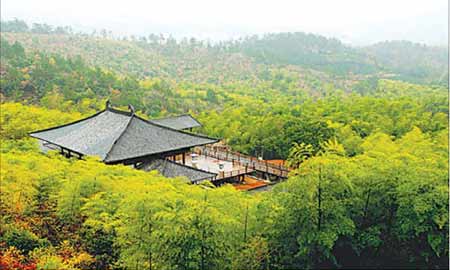
Rebuilt on its original site, the Tang Dynasty Imperial Tea Factory opens Today to tourists.(Photo Source: China Daily)
A festival opens today in Changxing of Zhejiang province showing the area's long history of tea production and contributions to tea culture in China.
Sponsored by the China International Tea Culture Society and Huzhou city government, and organized by Changxing county government, the first Changxing Lu Yu Tea Culture Festival will last to May 30.
One of the premier tourism events in Changxing, the festival also pays homage to Lu Yu, the most important figure in the history of Chinese tea culture.
Lu Yu is famed throughout the nation for his monumental work Classic of Tea - or Cha Jing - the first book ever written on cultivating, making and drinking tea.
After touring many parts of the country to study tea, Lu settled in Changxing in 760 during the Tang Dynasty (618-907).
Living as a hermit on a mountain called Guzhu for five years, Lu concentrated all his efforts in writing the Classic of Tea. It was printed 20 years later in 780, so comprehensive and erudite it earned Lu Yu the title Sage of Tea. Changxing has since been regarded by many a birthplace of Chinese tea culture.
Another contribution by Lu was a tribute to the imperial family recommending Zisun tea cultivated at the foot of Mount Guzhu. The emperor became so fond of the tea that China's first imperial tea factory was established in the county. Zisun tea was the favorite of imperial families in several dynasties over the following eight centuries.
Ways to cultivate and to prepare the tea using the water of Jinsha Spring in Guzhu were all recorded in Lu's classic.
Tea cultivation and production is still a pillar industry in Changxing today.
In addition to spreading tea culture, the ongoing festival is also used to promote Changxing's tourism industry.
Located in the north of Zhejiang, Changxing faces Taihu Lake - the third-largest freshwater lake in China - to the north and neighbors Tianmu Mountain in the west.
It was the birthplace of Chen Baxian, the first emperor of the Chen Dynasty (AD 557-589), a devout Buddhist who built many temples that are still well preserved today.
Changxing also has a large nature reserve for the Chinese alligator, a species rarely seen in the wild in other locales.